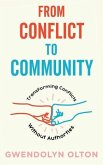Understanding Conflicts about Wildlife
A Biosocial Approach
Herausgeber: Hill, Catherine M.; Priston, Nancy E. C.; Webber, Amanda D.
Understanding Conflicts about Wildlife
A Biosocial Approach
Herausgeber: Hill, Catherine M.; Priston, Nancy E. C.; Webber, Amanda D.
- Gebundenes Buch
- Merkliste
- Auf die Merkliste
- Bewerten Bewerten
- Teilen
- Produkt teilen
- Produkterinnerung
- Produkterinnerung
Understanding Conflicts About Wildlife unites academics and practitioners to consider the political and social dimensions of 'human-wildlife conflicts'.
Andere Kunden interessierten sich auch für
![Wolf Conflicts Wolf Conflicts]() Ketil SkogenWolf Conflicts38,99 €
Ketil SkogenWolf Conflicts38,99 €![From Conflict to Community: Transforming Conflicts Without Authorities From Conflict to Community: Transforming Conflicts Without Authorities]() Gwendolyn OltonFrom Conflict to Community: Transforming Conflicts Without Authorities23,99 €
Gwendolyn OltonFrom Conflict to Community: Transforming Conflicts Without Authorities23,99 €![Introduction to Forensic Anthropology Introduction to Forensic Anthropology]() Steven N. Byers (USA New Mexico State University)Introduction to Forensic Anthropology227,99 €
Steven N. Byers (USA New Mexico State University)Introduction to Forensic Anthropology227,99 €![The Ascent of Man The Ascent of Man]() Henry DrummondThe Ascent of Man26,99 €
Henry DrummondThe Ascent of Man26,99 €![The Anthropology Graduate's Guide The Anthropology Graduate's Guide]() Carol J. EllickThe Anthropology Graduate's Guide42,99 €
Carol J. EllickThe Anthropology Graduate's Guide42,99 €![Introduction to Forensic Anthropology Introduction to Forensic Anthropology]() Steven N. Byers (USA New Mexico State University)Introduction to Forensic Anthropology106,99 €
Steven N. Byers (USA New Mexico State University)Introduction to Forensic Anthropology106,99 €![Gender Violence in the American Southwest (AD 1100-1300) Gender Violence in the American Southwest (AD 1100-1300)]() Debra L. MartinGender Violence in the American Southwest (AD 1100-1300)49,99 €
Debra L. MartinGender Violence in the American Southwest (AD 1100-1300)49,99 €-
-
-
Understanding Conflicts About Wildlife unites academics and practitioners to consider the political and social dimensions of 'human-wildlife conflicts'.
Hinweis: Dieser Artikel kann nur an eine deutsche Lieferadresse ausgeliefert werden.
Hinweis: Dieser Artikel kann nur an eine deutsche Lieferadresse ausgeliefert werden.
Produktdetails
- Produktdetails
- Rethinking Biosocial Anthropology
- Verlag: Berghahn Books
- Seitenzahl: 230
- Erscheinungstermin: 1. Mai 2017
- Englisch
- Abmessung: 235mm x 157mm x 17mm
- Gewicht: 440g
- ISBN-13: 9781785334627
- ISBN-10: 178533462X
- Artikelnr.: 46604341
- Herstellerkennzeichnung
- Libri GmbH
- Europaallee 1
- 36244 Bad Hersfeld
- gpsr@libri.de
- Rethinking Biosocial Anthropology
- Verlag: Berghahn Books
- Seitenzahl: 230
- Erscheinungstermin: 1. Mai 2017
- Englisch
- Abmessung: 235mm x 157mm x 17mm
- Gewicht: 440g
- ISBN-13: 9781785334627
- ISBN-10: 178533462X
- Artikelnr.: 46604341
- Herstellerkennzeichnung
- Libri GmbH
- Europaallee 1
- 36244 Bad Hersfeld
- gpsr@libri.de
Amanda D. Webber is a Lecturer in Conservation Science at Bristol Zoological Society. She is also an Honorary Research Associate at Oxford Brookes University. Her research focuses on human-wildlife interactions and she is interested in people's perceptions of wildlife (particularly urban or 'pest' species) and the development of co-existence strategies.
List of Figures and Tables Acknowledgements Introduction: Complex Problems: Using a Biosocial Approach to Understanding Human-Wildlife Interactions Catherine M. Hill Chapter 1. People, Perceptions and 'Pests': Human-Wildlife Interactions and the Politics of Conflict Phyllis C. Lee Chapter 2. Block, Push or Pull? Three Responses to Monkey Crop-Raiding in Japan John Knight Chapter 3.
Unintended Consequences in Conservation: How Conflict Mitigation May Raise the Conflict Level
- The Case of Wolf Management in Norway Ketil Skogen Chapter 4. Badger-Human Conflict: An Overlooked Historical Context for Bovine TB Debates in the UK Angela Cassidy Chapter 5. Savage Values: Conservation and Personhood in Southern Suriname Marc Brightman Chapter 6
. Wildlife Value Orientations as an Approach to Understanding the Social Context of Human-Wildlife Conflict
Alia M. Dietsch, Michael J. Manfredo and Tara L. Teel
Chapter 7. A Long Term Comparison of Local Perceptions of Crop Loss to Wildlife at Kibale National Park, Uganda: Exploring Consistency Across Individuals and Sites Lisa Naughton-Treves, Jessica L'Roe, Andrew L'Roe and Adrian Treves Chapter 8. Conservation Conflict Transformation: Addressing the Missing Link in Wildlife Conservation Francine Madden and Brian McQuinn Chapter 9. Engaging Farmers and Understanding Their Behaviour to Develop Effective Deterrents to Crop Damage by Wildlife Graham E. Wallace and Catherine M. Hill Chapter 10. Using Geographic Information Systems (GIS) at Sites of Negative Human-Wildlife Interactions: Current Applications and Future Developments Amanda D. Webber, Stewart Thompson, Neil Bailey and Nancy E. C. Priston Index
Unintended Consequences in Conservation: How Conflict Mitigation May Raise the Conflict Level
- The Case of Wolf Management in Norway Ketil Skogen Chapter 4. Badger-Human Conflict: An Overlooked Historical Context for Bovine TB Debates in the UK Angela Cassidy Chapter 5. Savage Values: Conservation and Personhood in Southern Suriname Marc Brightman Chapter 6
. Wildlife Value Orientations as an Approach to Understanding the Social Context of Human-Wildlife Conflict
Alia M. Dietsch, Michael J. Manfredo and Tara L. Teel
Chapter 7. A Long Term Comparison of Local Perceptions of Crop Loss to Wildlife at Kibale National Park, Uganda: Exploring Consistency Across Individuals and Sites Lisa Naughton-Treves, Jessica L'Roe, Andrew L'Roe and Adrian Treves Chapter 8. Conservation Conflict Transformation: Addressing the Missing Link in Wildlife Conservation Francine Madden and Brian McQuinn Chapter 9. Engaging Farmers and Understanding Their Behaviour to Develop Effective Deterrents to Crop Damage by Wildlife Graham E. Wallace and Catherine M. Hill Chapter 10. Using Geographic Information Systems (GIS) at Sites of Negative Human-Wildlife Interactions: Current Applications and Future Developments Amanda D. Webber, Stewart Thompson, Neil Bailey and Nancy E. C. Priston Index
List of Figures and Tables Acknowledgements Introduction: Complex Problems: Using a Biosocial Approach to Understanding Human-Wildlife Interactions Catherine M. Hill Chapter 1. People, Perceptions and 'Pests': Human-Wildlife Interactions and the Politics of Conflict Phyllis C. Lee Chapter 2. Block, Push or Pull? Three Responses to Monkey Crop-Raiding in Japan John Knight Chapter 3.
Unintended Consequences in Conservation: How Conflict Mitigation May Raise the Conflict Level
- The Case of Wolf Management in Norway Ketil Skogen Chapter 4. Badger-Human Conflict: An Overlooked Historical Context for Bovine TB Debates in the UK Angela Cassidy Chapter 5. Savage Values: Conservation and Personhood in Southern Suriname Marc Brightman Chapter 6
. Wildlife Value Orientations as an Approach to Understanding the Social Context of Human-Wildlife Conflict
Alia M. Dietsch, Michael J. Manfredo and Tara L. Teel
Chapter 7. A Long Term Comparison of Local Perceptions of Crop Loss to Wildlife at Kibale National Park, Uganda: Exploring Consistency Across Individuals and Sites Lisa Naughton-Treves, Jessica L'Roe, Andrew L'Roe and Adrian Treves Chapter 8. Conservation Conflict Transformation: Addressing the Missing Link in Wildlife Conservation Francine Madden and Brian McQuinn Chapter 9. Engaging Farmers and Understanding Their Behaviour to Develop Effective Deterrents to Crop Damage by Wildlife Graham E. Wallace and Catherine M. Hill Chapter 10. Using Geographic Information Systems (GIS) at Sites of Negative Human-Wildlife Interactions: Current Applications and Future Developments Amanda D. Webber, Stewart Thompson, Neil Bailey and Nancy E. C. Priston Index
Unintended Consequences in Conservation: How Conflict Mitigation May Raise the Conflict Level
- The Case of Wolf Management in Norway Ketil Skogen Chapter 4. Badger-Human Conflict: An Overlooked Historical Context for Bovine TB Debates in the UK Angela Cassidy Chapter 5. Savage Values: Conservation and Personhood in Southern Suriname Marc Brightman Chapter 6
. Wildlife Value Orientations as an Approach to Understanding the Social Context of Human-Wildlife Conflict
Alia M. Dietsch, Michael J. Manfredo and Tara L. Teel
Chapter 7. A Long Term Comparison of Local Perceptions of Crop Loss to Wildlife at Kibale National Park, Uganda: Exploring Consistency Across Individuals and Sites Lisa Naughton-Treves, Jessica L'Roe, Andrew L'Roe and Adrian Treves Chapter 8. Conservation Conflict Transformation: Addressing the Missing Link in Wildlife Conservation Francine Madden and Brian McQuinn Chapter 9. Engaging Farmers and Understanding Their Behaviour to Develop Effective Deterrents to Crop Damage by Wildlife Graham E. Wallace and Catherine M. Hill Chapter 10. Using Geographic Information Systems (GIS) at Sites of Negative Human-Wildlife Interactions: Current Applications and Future Developments Amanda D. Webber, Stewart Thompson, Neil Bailey and Nancy E. C. Priston Index








